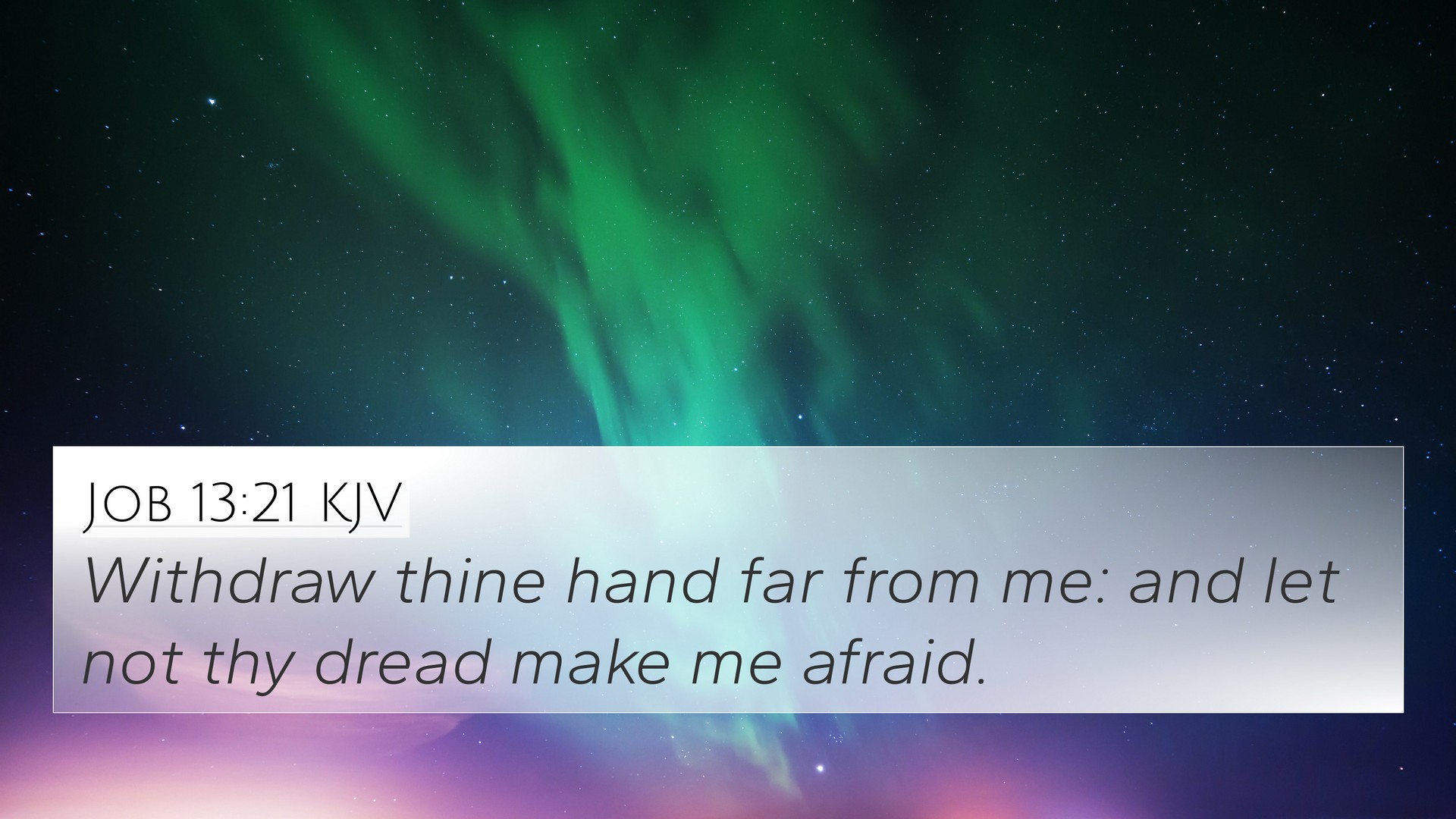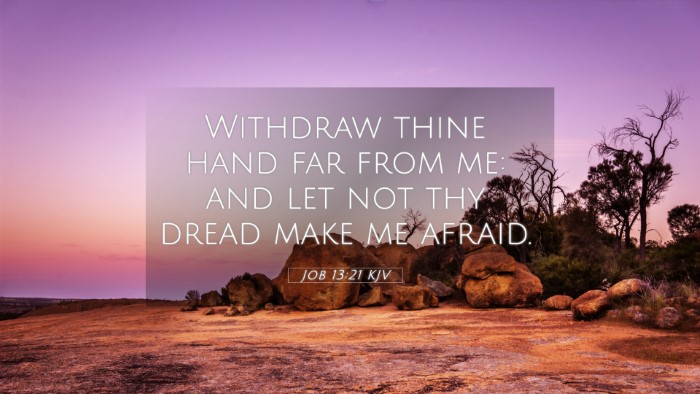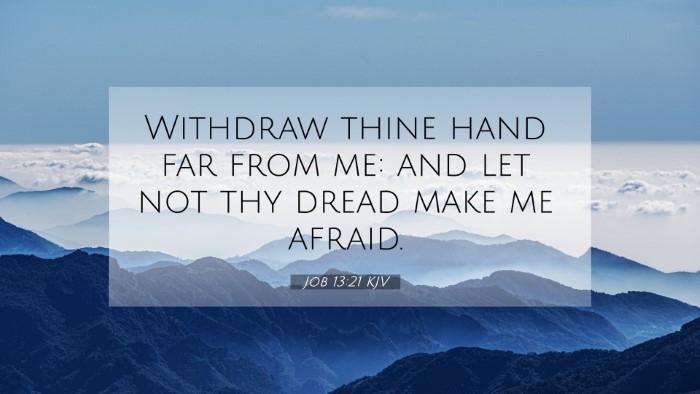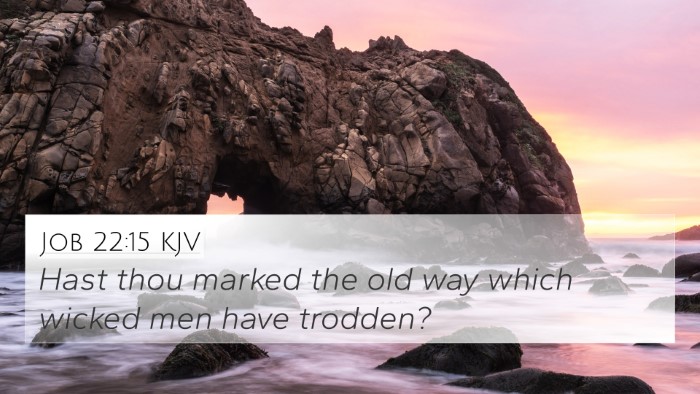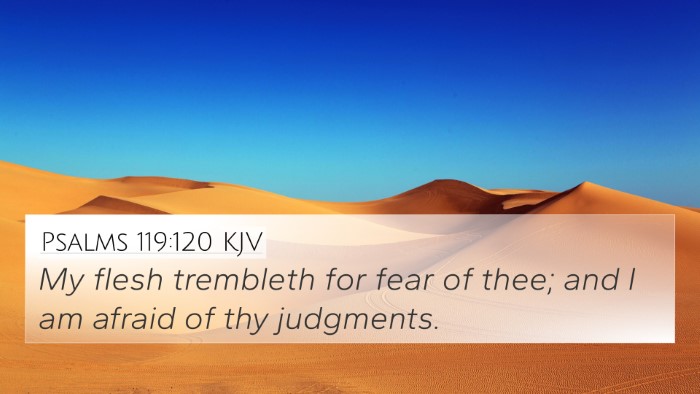Old Testament
Genesis Exodus Leviticus Numbers Deuteronomy Joshua Judges Ruth 1 Samuel 2 Samuel 1 Kings 2 Kings 1 Chronicles 2 Chronicles Ezra Nehemiah Esther Job Psalms Proverbs Ecclesiastes Song of Solomon Isaiah Jeremiah Lamentations Ezekiel Daniel Hosea Joel Amos Obadiah Jonah Micah Nahum Habakkuk Zephaniah Haggai Zechariah MalachiJob 13:21 Similar Verses
Job 13:21 Cross References
Withdraw thine hand far from me: and let not thy dread make me afraid.
Uncover the Rich Themes and Topics of This Bible Verse
Listed below are the Bible themes associated with Job 13:21. We invite you to explore each theme to gain deeper insights into the Scriptures.
Job 13:21 Cross Reference Verses
This section features a detailed cross-reference designed to enrich your understanding of the Scriptures. Below, you will find carefully selected verses that echo the themes and teachings related to Job 13:21 KJV. Click on any image to explore detailed analyses of related Bible verses and uncover deeper theological insights.
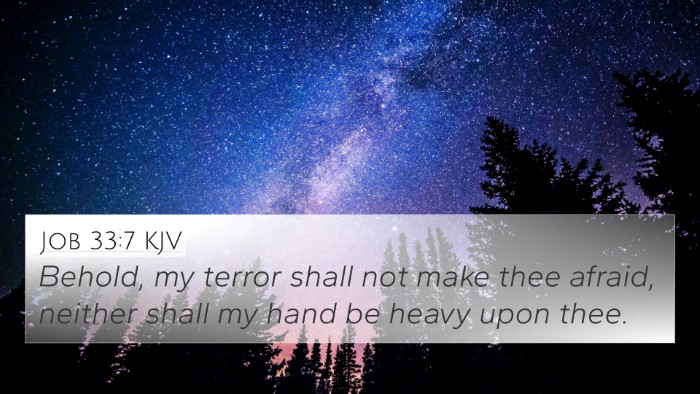
Job 33:7 (KJV) »
Behold, my terror shall not make thee afraid, neither shall my hand be heavy upon thee.

Job 10:20 (KJV) »
Are not my days few? cease then, and let me alone, that I may take comfort a little,
Job 13:21 Verse Analysis and Similar Verses
Understanding Job 13:21
Job 13:21 states: “Withdraw your hand far from me, and let not the dread of you make me afraid.” This verse encapsulates Job's plea to God amidst his suffering, reflecting both desperation and hope for divine engagement.
Summary of Meaning
The request in this verse signifies Job's struggle with the perception of God's presence as both a source of dread and hope. It underlines his desire for a fair hearing from God without the overwhelming fear of judgment. This duality in Job’s experience points to the complexity of human-divine interaction.
Insights from Public Domain Commentaries
-
Matthew Henry:
Matthew Henry elaborates on the concept of fear in the context of divine judgment. He indicates that while Job acknowledges God’s majesty and power, he seeks a relationship where God's presence is felt without the oppressive fear of punishment.
-
Albert Barnes:
Barnes emphasizes that Job's plea reflects a heartfelt yearning for understanding in the midst of suffering. He interprets Job's request as a desire for God to allow him to speak freely without the weight of divine fear hindering his confession and reasoning.
-
Adam Clarke:
According to Clarke, Job is expressing the need for a direct conversation with God, indicating trust in God's justice. He reflects on the importance of addressing God directly, suggesting that Job seeks reassurance of his standing before God amidst his turmoil.
Thematic Connections and Cross-References
Job 13:21 can be linked to various other scripture passages that explore themes of divine fear, justice, and the human condition. Here are some applicable cross-references:
- Psalm 39:9: “I was mute; I did not open my mouth, for it was you who did it.” - Reflects Job's restraint in the face of suffering.
- Job 10:3: “Does it please you to oppress me, to spurn the work of your hands?” - Job’s challenge in expressing his anguish toward God.
- Proverbs 28:14: “Blessed is the one who fears the Lord always, but whoever hardens their heart falls into trouble.” - Discusses the nature of fear in relation to wisdom.
- Isaiah 41:10: “Fear not, for I am with you; be not dismayed, for I am your God.” - Offers a contrasting promise of God’s presence without fear.
- Hebrews 4:16: “Let us then with confidence draw near to the throne of grace.” - Encourages believers to approach God without fear.
- Romans 8:15: “For you did not receive a spirit of slavery to fall back into fear, but you have received the Spirit of adoption…” - Speaks to the relationship dynamics with God.
- Psalm 139:23-24: “Search me, O God, and know my heart; test me and know my anxious thoughts.” - A plea for divine understanding amidst fear.
- Job 16:21: “O that a mere mortal might plead with God as one pleads for a friend!” - Illustrates the desire for dialogue with God.
- Job 31:35: “Oh, that I had someone to hear me! I sign my defense—let the Almighty answer me; let my accuser put his indictment in writing.” - Job's yearning for a fair hearing.
- Genesis 32:30: “So Jacob called the name of the place Peniel, saying, 'For I have seen God face to face, and yet my life has been delivered.'” - Reflects the concept of encountering God and living to tell about it.
Comparative Bible Verse Analysis
When engaging in comparative Bible verse analysis, understanding the connections between Job's plight and other Biblical narratives enriches the interpretation of Job 13:21. The struggle with divine communication can be traced through various characters, such as:
- **Moses** - As he encounters God on Mount Sinai, he expresses both reverence and fear.
- **David** - His Psalms often reflect a dynamic of fear and assurance in God's presence.
- **Paul** - In the New Testament, he frames the believer's relationship with God through grace, aiming to remove fear.
Finding Cross-References in the Bible
Navigating the connections between Bible verses requires tools for Bible cross-referencing, such as a Bible concordance or a Bible cross-reference guide. These resources can assist in:
- Identifying connections between Old and New Testament.
- Linking Bible scriptures thematically.
- Engaging in cross-referencing Bible study methods.
- Finding Bible verses related to specific themes.
Conclusion
Job 13:21 serves as a profound moment in the Book of Job, emphasizing the complexity of human emotions in relation to divine presence. By understanding this verse and its connections, believers can better grasp their own relationship with God, cultivating a deeper faith devoid of paralyzing fear.
